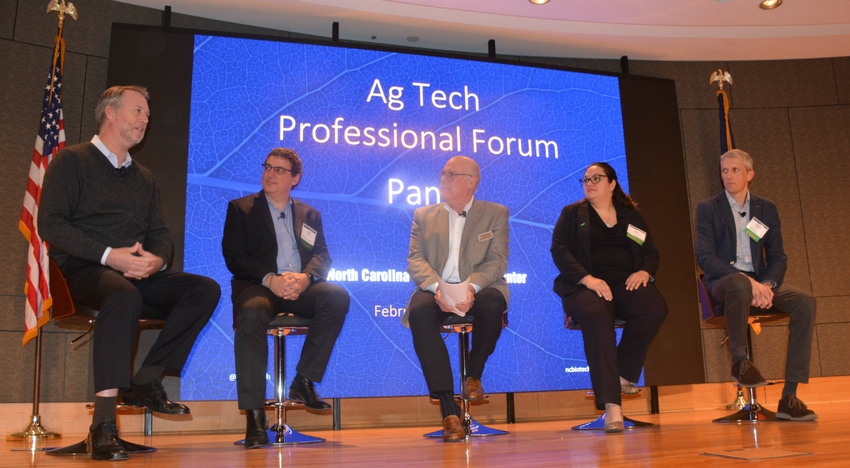
Improved sustainability and a systems approach that focuses on more than just delivering products to farmers will drive the crop protection business well into the future.
That’s the consensus of officials from Bayer, BASF, Syngenta and UPL Limited who were members of a panel discussion at the North Carolina Biotechnology Center in Research Triangle Park Feb. 19 looking at the future of the ag chem and seed business.
“As we were looking for products in the past, we are now looking for solutions where the product itself is only one element of an area of solutions that could be digital, that could be monitoring, that could be human interactions like stewardship. If we have that technology, we will be able to drive it for the benefits of the public and the long-term benefit of the company,” said Giles Galliou, head of Region Americas for Bayer Environmental Science.
Marianela Rodriquez-Carres, innovation scout lead for BASF, said crop protection companies now must enable sustainability when doing business. She said BASF focuses on a complete solution systems approach that uses sustainability metrics when delivering germplasm, seed treatments and crop protection products to the marketplace.
Syngenta has shifted its focus in recent years to improved sustainability. Charles Baxter, head, trait development for Syngenta, said the company began investing roughly $2 billion beginning in the fall of last year to develop sustainable products.
“Farmers really care about sustainability. For a lot of farmers, their aim is to pass the business on to their next generation. I think that’s very important to get the wider public to recognize there is a huge element in agriculture which is sustainability,” Baxter said.
“Nobody wants to harm the landscape. They farm because they know they want to preserve it for future generations. As an organization, I think we need to really find ways we can help our growers in that. Give growers value. But we can also help them to preserve their business because that’s preserving the environment they work in,” he added.
Adrian Pearcy, chief technology officer for UPL Ltd., said companies must develop products that go beyond just the monetary value and can move more easily through the regulatory process because they offer a broader value profile.
Through it all, the panelists agreed companies must emphasize to consumers and the public at large that ag products are safe and offer real benefits. They said this is particularly important in this litigious age.
“It is extremely concerning for our industry if we start to assume pharmaceutical company like liabilities for agricultural products. I don’t think it (litigation) is going to change the way we innovate; it is going to change the way we talk about our products. It’s going to change the way we interact with the consumer. These are great products that have proven track records. How our industry presents itself will be incredibly important moving forward,” Pearcy emphasized.
“Any product could be shot down by a frivolous lawsuit. I think unfortunately that is the societal situation we are in. I think we as an industry need to pull together and really present ourselves as being a solution provider that’s important to solve some of these grand challenges humanity faces,” Pearcy added.
Bayer’s Galliou agreed, emphasizing it is a real challenge for the entire industry. He said the industry must talk to consumers in a different way and be more aggressive as it talks to the public about the benefits of its products
“We need to talk about the benefits of that industry in more of a tangible, realistic way the wider public understands. There is a need for going back to a more tangible practical output of what those products really do and how they are really used,” Galliou said.
Baxter said the science-based regulatory process is critical and it is good that regulators have supported the science of products in lawsuits against agricultural chemicals and haven’t bowed to public opinion.
“There are innovative pipelines out there ready to support growers. With the science based regulatory system it means that those products will still be able to come to market. It’s just the challenge of how public opinion translates against herbicides in particular,” Baxter said.
Baxter said transparency is important, allowing downstream consumers to make a choice. He said companies need to be transparent about the safety of technology and what goes into producing the seeds and chemistries farmers use.
“They are either going to make a choice in terms of I don’t want to eat a product that has some of this technology on it or I’m going to pay a higher price for it because eventually if you take away some of these great chemistries, it’s going to mean growers have higher input costs and that’s going to translate downstream eventually,” Baxter said.
About the Author(s)
You May Also Like






